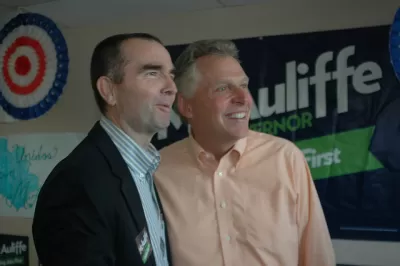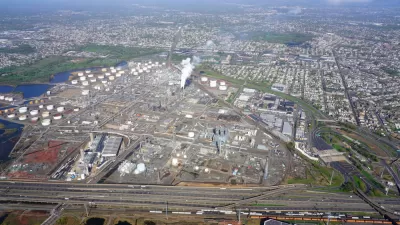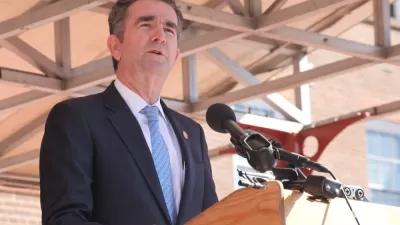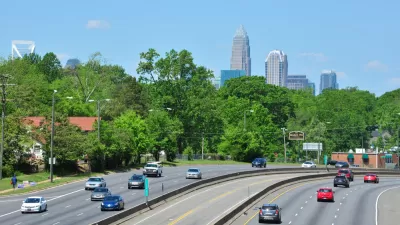A movement initiated by Gov. Terry McAuliffe (D-Va.) to join the East Coast carbon cap-and-trade program has accelerated with the election of his Democratic lieutenant governor, Ralph Northam, as governor. Similar news is expected from New Jersey.

"The Democratic Party's victory on Tuesday in the governor's race appears to have cemented the move toward climate regulations, with Lt. Gov. Ralph Northam beating Republican challenger Ed Gillespie," reports John Siciliano, who covers energy and environment issues for the Washington Examiner, on Nov. 9.
Incumbent Democratic Gov. Terry McAuliffe, had initiated a process to create a greenhouse gas system after President Trump decided to scrap the Obama administration's climate change regulations this year [including the clean power plan rule].
The Virginia Department of Environmental Quality will begin presenting its draft greenhouse gas program next week to the state's pollution board for approval to create the state's first cap-and-trade program to reduce greenhouse gas emissions.
If approved, Virginia would be the 10th member of the Regional Greenhouse Gas Initiative (RGGI, but pronounced "Reggi"), the oldest, but not the largest, cap-and-trade program in the United States. Unlike its younger counterpart in California, the trading program is restricted to carbon dioxide emissions from power plants. [In California, even motorists pay about 10-12 cents more per gallon of gas since transportation fuels fell "under the cap" in 2015.]
Siciliano goes on to describe what membership in RGGI would entail, e.g., placing a 'cap' on power plant emissions and how to spend carbon auction revenues.
=================================================================================================================
Tuesday's other gubernatorial race in New Jersey, which saw Democrat Philip D. Murphy, a political newcomer, best Lt. Gov. Kim Guadagno (R), to replace two-term Republican Gov. Chris Christie, brings up the same issue. Unlike Virginia, New Jersey was one of the nine convening members of RGGI in 2003, but Christie announced in May 2011 "that the state will pull out of the region’s 'gimmicky' cap-and-trade program by the end of the year," reported Christopher Baxter of NJ Advance Media for NJ.com at the time.
Last July, Christie "vetoed A4701 [pdf] that would have required the state to return to the Regional Greenhouse Gas Initiative," reported Susan K. Livio for NJ.com.
The fifth point of candidate Murphy's five-point plan on power generation would have that state rejoin the initiative, reported NJ.com's Claude Brodesser-Akner on Apr. 27.
Should New Jersey under a Gov. Philip D. Murphy rejoin RGGI, it would not be the first time an election has resulted in a state reversing its position on RGGI. Republican Gov. Mitt Romney of Massachusetts, also a 2003 convening member, chose not to officially join RGGI in 2005. Two years later it joined thanks to the election of Democrat Deval Patrick to succeed Romney.
Hat tip to Dino Grandoni, Washington Post's Power Post, Energy 2020.
FULL STORY: Virginia moving forward with cap-and-trade plan soon after Democratic win

Alabama: Trump Terminates Settlements for Black Communities Harmed By Raw Sewage
Trump deemed the landmark civil rights agreement “illegal DEI and environmental justice policy.”

Planetizen Federal Action Tracker
A weekly monitor of how Trump’s orders and actions are impacting planners and planning in America.

The 120 Year Old Tiny Home Villages That Sheltered San Francisco’s Earthquake Refugees
More than a century ago, San Francisco mobilized to house thousands of residents displaced by the 1906 earthquake. Could their strategy offer a model for the present?

In Both Crashes and Crime, Public Transportation is Far Safer than Driving
Contrary to popular assumptions, public transportation has far lower crash and crime rates than automobile travel. For safer communities, improve and encourage transit travel.

Report: Zoning Reforms Should Complement Nashville’s Ambitious Transit Plan
Without reform, restrictive zoning codes will limit the impact of the city’s planned transit expansion and could exclude some of the residents who depend on transit the most.

Judge Orders Release of Frozen IRA, IIJA Funding
The decision is a victory for environmental groups who charged that freezing funds for critical infrastructure and disaster response programs caused “real and irreparable harm” to communities.
Urban Design for Planners 1: Software Tools
This six-course series explores essential urban design concepts using open source software and equips planners with the tools they need to participate fully in the urban design process.
Planning for Universal Design
Learn the tools for implementing Universal Design in planning regulations.
Clanton & Associates, Inc.
Jessamine County Fiscal Court
Institute for Housing and Urban Development Studies (IHS)
City of Grandview
Harvard GSD Executive Education
Toledo-Lucas County Plan Commissions
Salt Lake City
NYU Wagner Graduate School of Public Service





























